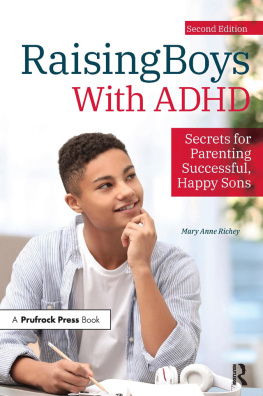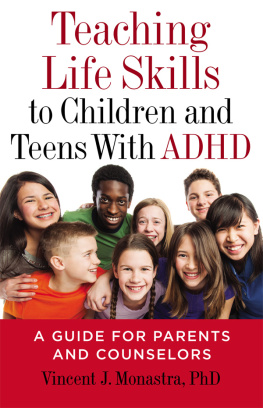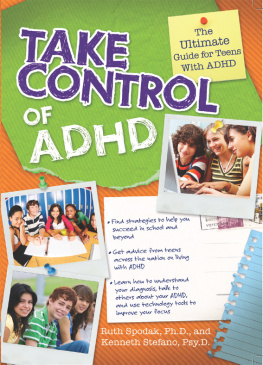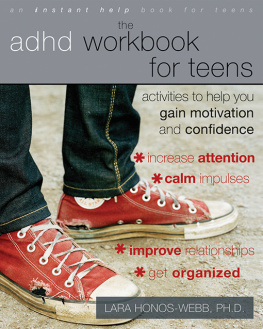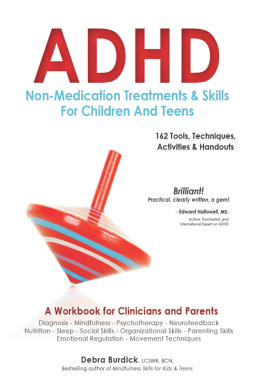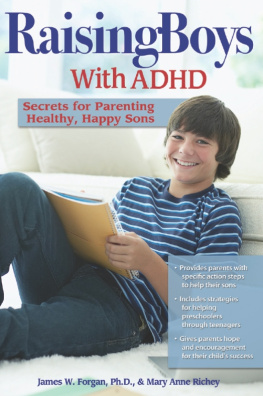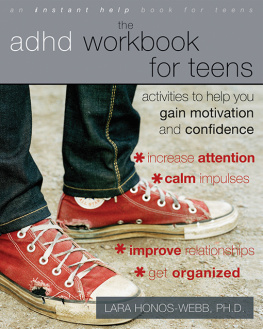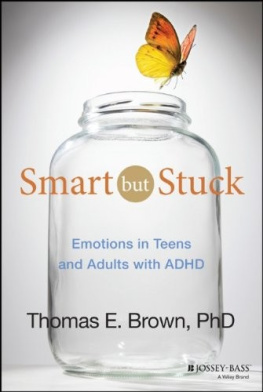Colleen Alexander-Roberts - ADHD & Teens
Here you can read online Colleen Alexander-Roberts - ADHD & Teens full text of the book (entire story) in english for free. Download pdf and epub, get meaning, cover and reviews about this ebook. year: 1995, publisher: Taylor Trade Publishing, genre: Children. Description of the work, (preface) as well as reviews are available. Best literature library LitArk.com created for fans of good reading and offers a wide selection of genres:
Romance novel
Science fiction
Adventure
Detective
Science
History
Home and family
Prose
Art
Politics
Computer
Non-fiction
Religion
Business
Children
Humor
Choose a favorite category and find really read worthwhile books. Enjoy immersion in the world of imagination, feel the emotions of the characters or learn something new for yourself, make an fascinating discovery.

- Book:ADHD & Teens
- Author:
- Publisher:Taylor Trade Publishing
- Genre:
- Year:1995
- Rating:3 / 5
- Favourites:Add to favourites
- Your mark:
- 60
- 1
- 2
- 3
- 4
- 5
ADHD & Teens: summary, description and annotation
We offer to read an annotation, description, summary or preface (depends on what the author of the book "ADHD & Teens" wrote himself). If you haven't found the necessary information about the book — write in the comments, we will try to find it.
ADHD and Teens is a manual of practical advice to help parents cope with the problems that can arise during these years. A crash course is offered on parenting styles that really work with teens with ADHD and how these styles allow the teen to safely move from dependence to independence.
ADHD & Teens — read online for free the complete book (whole text) full work
Below is the text of the book, divided by pages. System saving the place of the last page read, allows you to conveniently read the book "ADHD & Teens" online for free, without having to search again every time where you left off. Put a bookmark, and you can go to the page where you finished reading at any time.
Font size:
Interval:
Bookmark:
Making It through the Tough Years
Colleen Alexander-Roberts

Copyright 1995 by Colleen Alexander-Roberts
All rights reserved.
No part of this book may be reproduced in any form without written permission from the publisher.
TAYLOR TRADE PUBLISHING
An Imprint of the Rowman & Littlefield Publishing Group
4501 Forbes Boulevard, Suite 200
Lanham, MD 20706
Distributed by National Book Network
Designed by Hespenheide Design
Note: This book is not intended to serve in the place of a physician. Always consult your childs pediatrician before altering childcare practices.
Library of Congress Cataloging-in-Publication Data
Alexander-Roberts, Colleen.
ADHD and teens : a parents guide to making it through the tough years / by Colleen Alexander-Roberts.
p. cm.
Includes bibliographical references (p. ) and index.
ISBN 0-87833-899-3 ISBN 978-0-8783-3899-3
1. Attention-deficit disorder in adolescencePublic works.
I. Title.
| RJ506.H9A575 1995 | 95-23078 |
| 616.858900835--dc20 | CIP |
Printed in the United States of America
by Paul T. Elliott, MD
by Louis B. Cady, MD
, by Paul T. Elliott, MD
Individuals with attention deficit hyperactivity disorder often live lives filled with contradictions and struggles. For some, simple survival requires a supreme effort on a daily basis.
This book, the natural and essential sequel to Ms. Colleen Alexander-Robertss The ADHD Parenting Handbook, is replete with insights, tools, and techniques for properly rearing and training teens as they develop, producing far more functional and productive adults who will greatly benefit themselves, their families, and our entire society.
ADHD may first become apparent in the teenage years, particularly in those who are less hyperactive. There are several reasons for this, but certainly the onset of puberty has an amplifying effect on the underlying brain function. For this reason, parents often believe that it has simply begun out of nowhere. Careful questioning and reviewing the past behavior and performance of the patient, however, usually produces evidence of its pre-existence. This is especially true in girls, since they have a tendency to exhibit less hyperactivity when they are affected by ADHD.
Ms. Alexander-Roberts also emphasizes that ADHD is a life-long condition. The previously held opinion that most patients outgrew ADHD has recently been proven incorrect. In fact, this would be like saying that a patient outgrows her brain. ADHD does, however, change in different stages of lifeoften dramatically. Ms. Alexander-Roberts has correctly identified ADHD as a biological disorder, as is generally supported by current research. She has also correctly affirmed the position that we should remove ADHD and its accompanying stigma from the realm of psychiatric or mental disorders, viewing it instead as a neurological condition with psychological manifestations.
In the case of younger children, ADHD can be frustrating to parents and others who live around the affected child. However, living with and raising an ADHD person who is undergoing the teenage experience is a monumental task at best. This is an extremely trying time for everyone involved and usually involves not only to immediate family members but also the extended family, as well as friends and the school, with ramifications in extracurricular activities and every other aspect of the ADHD individuals life.
Living with and parenting such a child requires well-educated, highly experienced, infinitely patient, and doggedly determined parents. Obviously, this is a rare combination for any parent. Furthermore, by the time parents finally feel well qualified, they have all the familys teenagers launched into adulthood. These highly qualified people are then left with no one to assist. Therefore the majority of societys best qualified and most highly experienced people are underemployed as the next generation of teens arrive on the scene to be greeted by the next generation of parental naivet, inexperience, and inadequacy.
A child development specialist once said, Each year society is invaded by another generation of barbarians who must be civilized. It seems that some ADHD teens are often inaccurately described as barbarians. Many parents, grandparents, teachers, and family friends will testify that the language often completely fails an adequate description of the behavior of the ADHD teen.
Momentarily setting aside humor, it is an increasing theory that many conditions, previously otherwise defined, may actually be a part of ADHD. Whether or not this is the case, they certainly occur more frequently with ADHD. As Ms. Alexander-Roberts points out, these are most often referred to as comorbidities. Comorbidities may include, among other things, sleep disturbance, learning disabilities, oppositional behavior, or oppositional defiant disorder, speech pathology, depression, obsessive-compulsive disorder (OCD), panic attacks, anxiety, bipolar disorder (manic-depressive disorder), and many other behavior disorders. Whether these may often exist as a part of ADHD as well as existing as separate conditions present with ADHD, as is now thought, remains to be determined through more extensive research. As Ms. Alexander-Roberts appropriately points out, these are frequently more manageable, or perhaps become nonexistent, with proper medication.
A concept inadequately considered is that many suicides by teens and young adults may, in fact, be partially contributed to by the impulsive nature of the teen with ADHD, including the patients tendency to have a poor recollection of past experiences and a short-term, dim, and narrow view of the future. This concept has not been adequately addressed before this book. This deserves far greater attention and much more study than it has received in the past. As our social structure deteriorates, providing a less supportive, less structured environment for the teen with ADHD, we must seriously consider that inadequate medical management and supportive techniques may contribute to an increasing teen-suicide rate.
Unfortunately, many in our society will continue to label ADHD as simply an excuse for poor self-discipline and a desire on the patients part to avoid taking responsibility for his own actions. This distressingly superficial disposal of the patient with ADHD does not improve any situation. It frequently serves only to increase the sense of anger, frustration, and despair that the teen and parents experience. However, it should be clearly understood that ADHD is not an excuse for anything.
Ms. Alexander-Roberts effectively points out that the successful learning of these behaviors is much less likely if the teen is not adequately medicated first. She emphasizes that it is rather futile to attempt cognitive therapy and other training methods without adequate initial medication control.
While the majority of inmates in the criminal justice system have ADHD, it does not cause criminal behavior. However, criminal behavior, like suicide, may be a consequence of the ADHD patients tendency to live for the moment. In the teenage years, fraught with a genuine dearth of experience, these impulsive tendencies may not be restrained by family or community social mores. It has been said that poor judgment is untreatable. However, poor judgment can be replaced by better judgment derived from proper training and education of the teen in the development process, but this is very difficult without proper medication at the outset.
Font size:
Interval:
Bookmark:
Similar books «ADHD & Teens»
Look at similar books to ADHD & Teens. We have selected literature similar in name and meaning in the hope of providing readers with more options to find new, interesting, not yet read works.
Discussion, reviews of the book ADHD & Teens and just readers' own opinions. Leave your comments, write what you think about the work, its meaning or the main characters. Specify what exactly you liked and what you didn't like, and why you think so.

